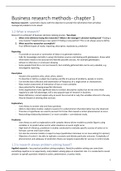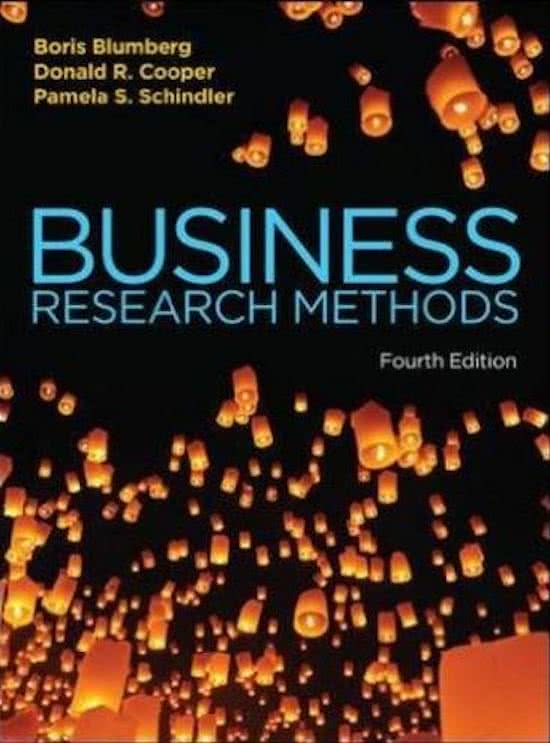Business research methods- chapter 1
Business research = systematic inquiry with the objective to provide the information that will allow
managerial problems to be solved.
1.2 What is research?
Research is a vital part of business decision-making process. Two steps:
1. What is the dilemma facing the researcher? What is the manager’s decision-making task? Finding a
new investor? Implementing a new system? Finding a new partner? This is not always easy to define.
2. What must the researcher accomplish?
Four different types of study: reporting, descriptive, explanatory, predictive
Reporting
- To provide an account or summation of data or to generate statistics
- Calls for knowledge and skills in using information sources and dealing with gatekeepers. Know what
information needs to be assessed and identify possible sources, for example gatekeepers.
- Almost no inference or conclusion drawing
- Some people think this is not real research, but carefully gathered data can be very valuable, e.g.
investigative reporting.
Descriptive
- Answers the questions who, what, when, where.
- To describe or define a subject by creating a profile of a group of problems, people or events.
- Can involve data collection and examination of frequency of a single event or characteristic
- May involve assessment of interaction of two or more variables
- Have potential for drawing powerful inferences
- Some organizations have significant data to conduct descriptive studies but do not mine them
regularly to take full advantage, still a very popular type of research in business.
- Major deficiency: cannot explain why an event has occurred or why the variables interact in the way
they do (based on existing data sources).
Explanatory
- Uses theory to answer why and how questions
- Adds to descriptive studies: explains reasons for a phenomenon that descriptive has only observed
- Theories or hypotheses are used to account for forces that caused a certain phenomenon to occur
- Researching relationship between 2 or more variables = correlational study.
Predictive
- Uses theory as well as explanations with complex theory-driven models to predict figures using
variables or to predict when and in what situations an event might occur.
- High level of inference, prediction in studies conducted to evaluate specific courses of action or to
forecast current and future values
- Can also be scenario models or expert surveys (qualitative interviews on an issue asking for opinion)
- Objective of control = be able to replicate a scenario and dictate particular outcome. Complexity of
phenomenon and adequacy of prediction theory are largely responsible for success in control study.
1.3 Is research always problem-solving based?
Applied research = has practical problem-solving emphasis. Need for problem-solving can come from
something negative or an opportunity, and problem-solving plays an important role. It is conducted to reveal
answers to specific questions related to action, performance, or policy needs.
1
,Basic research aims to solve perplexing questions (problems) of theoretical nature with little direct impact on
action, performance, or policy. Applied science uses pure/basic research from other disciplines (economics,
psychology, sociology)
1.4 What makes good research?
Good research: generates dependable data, derived through practices conducted professionally and that can
be used and relied upon. It follows structure of scientific method
Desirable decision-oriented research
1. Purpose clearly defined
• Distinguishes between organization problem, manager’s perception and research problem
2. Research process detailed
• To provide a complete research proposal
3. Research design thoroughly planned
• Clarification of exploratory procedures, sample unit, sampling methodology, and data
collection procedures
4. High ethical standards applied
• To protect participants, organizations, clients and researchers
• Recommendations do not exceed scope of study
• Methodology and limitations reflect restraints and concerns for accuracy
5. Limitations frankly revealed
• Desired procedures and samples are compared with actual procedures and samples in study
• Impact on findings and conclusions is detailed
6. Adequate analysis for decision-makers needs
• Sufficiently detailed findings are tied to collection instruments
7. Findings presented unambiguously
• Clear presentation in words, tables and graphs
• Logically organized information to facilitate decision-making
8. Conclusions justified
9. Researcher’s experience reflected
1.5 Research philosophies
Research = based on reasoning (theory) and observations (data or information).
Positivism
Adopted from natural sciences, 3 basic principles:
1. Social world exists externally and is viewed objectively
2. Research is value free
3. Researcher is independent, taking role of an objective analyst
Knowledge develops by investigating the social reality through observing facts:
1. Hypothesizing fundamental laws and deducing what kind of observations support or reject
theoretical predictions of hypotheses
2. Identifying causalities that form the base of fundamental laws
3. Research is conducted to test whether observations of the world fit the derived fundamental laws
and to assess to what extent detected causalities can be generalized
Assumptions:
- Social world observed by collecting objective facts
- Social world consists of simple elements to which it can be reduced
2
,Scientists believes observable facts are objective because they are external, they cannot influence them, and
research is conducted value-free. Therefore, all researchers arrive at the same facts describing the social
world, so concepts need to be operationalized to allow a quantitative measurement of facts.
The social world can be reduced to simple elements and reducing them to fundamental laws is best way to
investigate: we single out one explanation to understand a phenomenon and deliberately neglect other
aspects which will be investigated in separate studies.
Interpretivism
This philosophy believed the social world cannot be understood with principles form natural sciences, social
sciences require a different research philosophy. 3 principles:
1. Social world is constructed and is given meaning subjectively by people
2. Researcher is part of what is observed
3. Research is driven by interests
Simple fundamental laws are insufficient to understand complex social phenomena and objective
observation of the social world is impossible: social world has a meaning for human beings and is constructed
by intentional behaviour and actions.
Knowledge is developed and theory built through developing ideas inducted from the observed and
interpreted social constructs.
Interpretivism attempts to understand subjective realities and to offer interpretative explanations.
For example action research: where researchers engage in active collaboration with participants to address
real-life problems in a specific context, and aim to offer and implement feasible solutions to the problem.
Researchers offer interpretation of people’s interpretation of world, so researchers’ interpretation is socially
constructed, reflecting their motives and beliefs.
Assumptions:
- Social world is observed by seeing what meanings people give to it and interpreting these meanings
from their viewpoint
- Social phenomena can only be understood by looking at totality
Researchers need to explore why people have different experiences and understand how these difficulties
result in different constructions and meanings people give to social world. We research by making sense of
how people interpret the social world so dig into processes of subjective interpretation, acknowledging
specific motivations and interests of participants. Social phenomena are highly complex and unique resulting
from multiple circumstances constructed by many individuals. Therefore, interpretivism does not attach
great deal of importance to the generalizability of findings. The world is constantly changing and what
seemed sensible three years ago may not hold now.
Realism
Shares principles of positivism and interpretivism.
- Social sciences can rely on approach dominant in natural sciences: accepts existence of reality
independent of human beliefs and behaviour
- Understanding people and their behaviour requires acknowledgement of subjectivity inherent to
humans.
- There are social processes and forces beyond human control, affecting beliefs and behaviour acting
at macro level.
- Critical realism = recognizes existence of a gap between the researcher’s concept of reality and the
true but unknown reality → research is not value free and is conducted within broader framework
based on current knowledge and concept of reality.
3
, Research implications of positivism and interpretivism
Positivism Interpretivism
Basic principles
View of world External and objective Socially constructed and subjective
Involvement of Independent Part of what is observed and sometimes actively
researcher collaborates
Researcher’s Research is value free Driven by human interest
influence
Assumptions
What is observed? Objective, often quantitative, facts Subjective interpretations of meanings
How is knowledge Reducing phenomena to simple Taking broad and total view of phenomena to
developed? elements representing general laws detect explanations beyond current knowledge
Difference: positivists research by testing whether theoretically derived hypotheses hold for situations
investigated. If objective fact supports H, then underlying fundamental laws are applicable and validity is
enforced. Value of research increases with generalizability because a detected relationship that cannot be
linked to other similar circumstances, does not qualify as fundamental law. This calls for large sample sizes to
ensure that findings based on sample investigated represent whole population.
Interpretivists offer thick and rich descriptions of phenomena which are interpreted to understand what is
happening. Generalization is of minor importance, so smaller sample sizes are sufficient.
Restrictions for a combined approach:
- Immense effort required to conduct a study in both ways
- Thickness of description and sample size have a substitutive relationship
1.6 Scientific reasoning
Scientific research includes a theory, its position is linked to a reasoning approach (deduction/induction)/
Deduction
= form of inference that purports to be conclusive: the conclusion must follow from the reasons given which
have led to the conclusion so they represent proof.
For a deduction to be correct it must be true and valid:
- Premises (reasons) given must agree with real world (true)
- Conclusion must follow from premises (valid)
Valid means it is impossible for conclusion to be false if premises are true. Conclusions not justified if one or
more premises is untrue or the argument form is unvalid.
Premise 1: Committed employees can be trusted not to steal
Premise 2: John is a committed employee
Conclusion: John can be trusted not to steal
Induction
= to draw a conclusion from one or more particular facts or pieces of evidence. The conclusion explains facts
and facts support the conclusion. Not same strength as the relationship of reasons-conclusions (deduction).
Conclusion: only a hypothesis, one explanation even though other explanations fit the facts as well, there
may be more conclusions or explanations. There is an inferential jump beyond the evidence presented. You
suggest answers that all have a chance of being true, but some you have more confidence in →
- We determine the nature of evidence needed to confirm or reject hypotheses
- Design methods by which to discover and measure this other evidence
4





